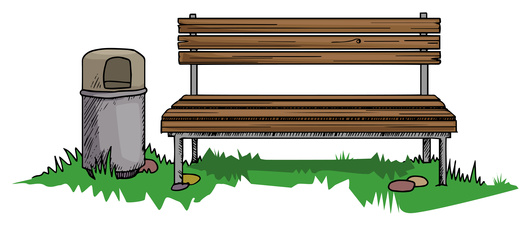
I sat alone on a bench in the park having lunch on one of those days when the sky beams blue, nibbling on a chocolate chip cookie, when I heard this:
“I mean you no harm. I just want to eat my lunch.”
And a young black man in a green parka sat on the bench next to me.
A green parka.
On a hot day.
I mean you no harm.
My brain, the lizard part, sort of bolted upright. The lizard part is the deep, dark center of all that gray matter in your head, and when it bolts upright, it sends chemicals zinging through the body. Adrenaline. Cortisol. The stuff that gets the heart pumped and the feet doing a getaway jig beneath the body. It’s the part of the brain that makes you venture out of the cave at dawn and hunt for food in Safeway.
The lizard brain quickly scoped out the situation.
I mean you no harm.
This is something someone will say if harm is exactly what they intend to do. Like the dentist who says, This won’t hurt a bit, and then pulls your lip back and jams a needle into the soft part of your gum.
I mean you no harm.
Years ago, in another park, on another bench, on another lunch hour, another black man sat next to me. “Some people stole my stuff. I’m gonna blow them away with an Uzi,” he said, and I believed him. His face was full of angry scars. The nearby businessmen in their suits got up and walked away. The women with their carriages put away their snacks and hurried off. Even the policemen who patrolled the park on horseback had disappeared. I was left alone with an angry black man, and my empty Calistoga bottle. I curled my fingers around it to use as a club.
Across from that park sat a historic courthouse. The story goes, on a November night in 1933, a crowd of over 6,000 enraged people stormed the courthouse, dragged out two men who had murdered the son of a department store owner, and lynched them. The tree still stood. I was sitting underneath it. That park radiated bad vibes.
Had my lizard brain been awake at the time, I would have followed the mass migration out. Instead, I tried to talk the angry man out of his plan.
“You’d be as bad as them,” I said. “Worse. Have you filed a report? Contacted the police?”
“They won’t do nuthin.”
We discussed the situation. Something I said reached him. Maybe it was just the fact someone took the time to listen. Park benches seem to invite people to unload on strangers. Free therapy. But I needed to get back to work. When I got up, he got up. When I headed off, he headed off beside me. “We’ve got to stick together,” he said. “We’re alike, you and me.”
I stopped and squared off, all 5 feet 4 inches, in front of him.
“You’re not going to follow me,” I said. Free therapy was one thing, a man with an undisclosed mission was another.
He backed off, hands raised. His version of I mean you no harm.
I didn’t know what the man in the green parka on a hot afternoon meant by his statement, but I felt unsettled, remembering the other park, the other man. I tried to play it cool. Nibbled a little faster on my cookie. From the corner of my eye I saw him reach into a brown paper sack. He started to pull something out. The lizard brain yelled: duck and cover! I scarfed down the cookie.
The man unwrapped a sandwich.
The lizard brain settled down.
I mean you no harm.
This is something someone will say if they’re afraid the other person is going to do them harm. Like when you come upon a strange dog that may or may not be rabid, but just to be safe, you offer the flat of your palm for him to sniff.
I mean you no harm.
Reassure him, my emotional brain told me. This is the second layer, the one that makes you drop a dollar in the Salvation Army bucket and then cluck the bell-ringer under the chin. It urged me to tell this man he can sit wherever he darn well pleases. Don’t make this about a lone white woman sitting next to a lone black man. Did Rosa Parks say “I mean you no harm” when she sat her tired self down on the bus?
My rational brain, the outer cortex, told me to leave the man alone. He just wants to eat his sandwich in peace.
All of this happened in a flash. Sandwich. Rosa Parks. Peace. The time it took to crumple my cookie wrapper. I got up, ready to head back to work, and so he wouldn’t think I was leaving because I felt threatened, I said, “Enjoy your lunch.”
He sighed. “I’ll try,” he said.
There it was. The veiled inquiry: is this therapy bench open for business? Or was it something else? A desire to connect with another human?
I wanted to place a comforting hand on his shoulder, prefaced by: I mean you no harm.
But office hours were over.


